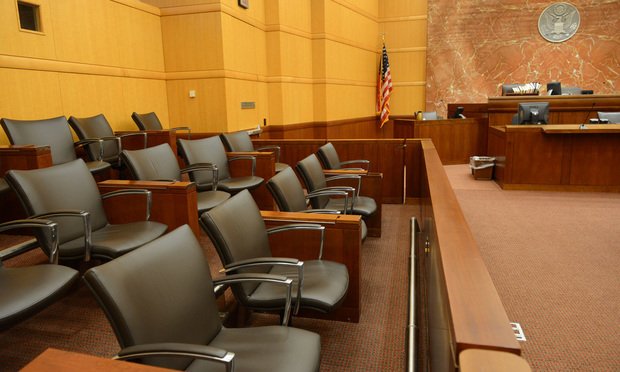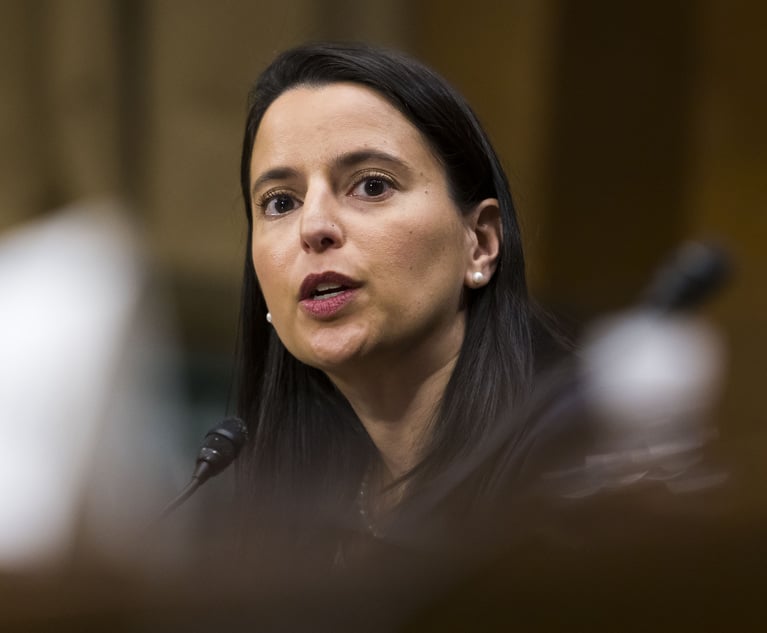Suit Accuses Kern County of Denying Public Access to Court Proceedings
"Courts across the country, including other superior courts in California, have balanced public safety while safeguarding the public's constitutional right to access court proceedings," the complaint said.
June 26, 2020 at 06:55 PM
4 minute read
 Jury box. Credit: ALM
Jury box. Credit: ALM
Two public-rights groups on Friday sued Kern County Superior Court, alleging courthouse leaders have unlawfully blocked access to criminal proceedings during the COVID-19 pandemic.
The ACLU and the First Amendment Coalition, along with relatives of several defendants, claim the Central Valley court is violating the public's right to watch arraignments, preliminary hearings and trials, according to a complaint filed in the U.S. District Court for the Eastern District of California.
"Courts across the country, including other superior courts in California, have balanced public safety while safeguarding the public's constitutional right to access court proceedings by simply providing publicly available call-in numbers so that members of the press and public can listen as courts can conduct business," according to the complaint, signed by Kathleen Guneratne, a senior staff attorney at the ACLU Foundation of Northern California, and David Snyder, executive director of and attorney for the First Amendment Coalition.
The plaintiffs said other courts, including Contra Costa County, "have provided limited physical access to the public and/or remote access to jury trials and other criminal and civil proceedings." The complaint said Kern County "could easily do the same. Because they have not, the Order violates the First Amendment of the Constitution."
Kristin Davis, Kern County Superior Court's public affairs officer, declined to comment on the pending litigation.
California's courts have taken different approaches during the pandemic to balance the public's right to witness proceedings with the need to reduce the risk of spreading the novel coronavirus.
Mariposa County Superior Court, for example, limits physical access to its historic courthouse but provides live streams of all public proceedings. Santa Clara County Superior Court provides listen-only telephone lines to allow the public to monitor certain proceedings. Sacramento County's court offers live streams and a lottery for spectator seating in criminal jury trials and some sentencing hearings.
Still, the First Amendment Coalition has documented instances around the state where public access in any form was denied, including an April hearing in the Ghost Ship fire case where reporters were shut out of the Alameda County courtroom and lawyers, operating under a gag order, could not say what happened.
Snyder wrote to the Judicial Council on June 15 asking for "immediate, concrete" steps at the state level to ensure public access to court operations.
"We understand the challenges that California courts face amid a global pandemic," Snyder said. "We do not doubt that restricting access consistent with social distancing best practices and expanding remote hearings is the right thing to do. But failures by some courts to prevent secret proceedings and extended delays in availability of records have resulted in serious, ongoing constitutional violations."
Kern County's website says the public "will be authorized by the presiding judge or the assigned judicial officer to attend all scheduled hearings in-person, provided they wear face coverings and maintain the required physical distancing of at least six (6) feet." Those who want to attend criminal proceedings are asked to talk to the "attorney of record" in the case or to ask courthouse security screening officers.
But court observers from the ACLU and the First Amendment Coalition, as well as the mothers of two defendants, contend security officers told them on many occasions that only parties to a case and their attorneys could enter the courthouse.
The court announced in April that the public could access some remote proceedings by telephone or video. But the access was available to only a handful of departments, and information on how to connect to the proceedings was removed by the court as of June 24, according to the complaint.
This content has been archived. It is available through our partners, LexisNexis® and Bloomberg Law.
To view this content, please continue to their sites.
Not a Lexis Subscriber?
Subscribe Now
Not a Bloomberg Law Subscriber?
Subscribe Now
NOT FOR REPRINT
© 2025 ALM Global, LLC, All Rights Reserved. Request academic re-use from www.copyright.com. All other uses, submit a request to [email protected]. For more information visit Asset & Logo Licensing.
You Might Like
View All

Federal Judge Pauses Trump Funding Freeze as Democratic AGs Plan Suit
4 minute readTrending Stories
- 1Google Makes Appeal to Overturn Jury Verdict Branding the Play Store as an Illegal Monopoly
- 2First Amendment Litigator Returns to Gibson Dunn
- 3In Record Year for Baker Botts, Revenue Up 11.8%, PEP Up 17.6%
- 4Loopholes, DNA Collection and Tech: Does Your Consent as a User of a Genealogy Website Override Another Person’s Fourth Amendment Right?
- 5Free Microsoft Browser Extension Is Costing Content Creators, Class Action Claims
Who Got The Work
J. Brugh Lower of Gibbons has entered an appearance for industrial equipment supplier Devco Corporation in a pending trademark infringement lawsuit. The suit, accusing the defendant of selling knock-off Graco products, was filed Dec. 18 in New Jersey District Court by Rivkin Radler on behalf of Graco Inc. and Graco Minnesota. The case, assigned to U.S. District Judge Zahid N. Quraishi, is 3:24-cv-11294, Graco Inc. et al v. Devco Corporation.
Who Got The Work
Rebecca Maller-Stein and Kent A. Yalowitz of Arnold & Porter Kaye Scholer have entered their appearances for Hanaco Venture Capital and its executives, Lior Prosor and David Frankel, in a pending securities lawsuit. The action, filed on Dec. 24 in New York Southern District Court by Zell, Aron & Co. on behalf of Goldeneye Advisors, accuses the defendants of negligently and fraudulently managing the plaintiff's $1 million investment. The case, assigned to U.S. District Judge Vernon S. Broderick, is 1:24-cv-09918, Goldeneye Advisors, LLC v. Hanaco Venture Capital, Ltd. et al.
Who Got The Work
Attorneys from A&O Shearman has stepped in as defense counsel for Toronto-Dominion Bank and other defendants in a pending securities class action. The suit, filed Dec. 11 in New York Southern District Court by Bleichmar Fonti & Auld, accuses the defendants of concealing the bank's 'pervasive' deficiencies in regards to its compliance with the Bank Secrecy Act and the quality of its anti-money laundering controls. The case, assigned to U.S. District Judge Arun Subramanian, is 1:24-cv-09445, Gonzalez v. The Toronto-Dominion Bank et al.
Who Got The Work
Crown Castle International, a Pennsylvania company providing shared communications infrastructure, has turned to Luke D. Wolf of Gordon Rees Scully Mansukhani to fend off a pending breach-of-contract lawsuit. The court action, filed Nov. 25 in Michigan Eastern District Court by Hooper Hathaway PC on behalf of The Town Residences LLC, accuses Crown Castle of failing to transfer approximately $30,000 in utility payments from T-Mobile in breach of a roof-top lease and assignment agreement. The case, assigned to U.S. District Judge Susan K. Declercq, is 2:24-cv-13131, The Town Residences LLC v. T-Mobile US, Inc. et al.
Who Got The Work
Wilfred P. Coronato and Daniel M. Schwartz of McCarter & English have stepped in as defense counsel to Electrolux Home Products Inc. in a pending product liability lawsuit. The court action, filed Nov. 26 in New York Eastern District Court by Poulos Lopiccolo PC and Nagel Rice LLP on behalf of David Stern, alleges that the defendant's refrigerators’ drawers and shelving repeatedly break and fall apart within months after purchase. The case, assigned to U.S. District Judge Joan M. Azrack, is 2:24-cv-08204, Stern v. Electrolux Home Products, Inc.
Featured Firms
Law Offices of Gary Martin Hays & Associates, P.C.
(470) 294-1674
Law Offices of Mark E. Salomone
(857) 444-6468
Smith & Hassler
(713) 739-1250








